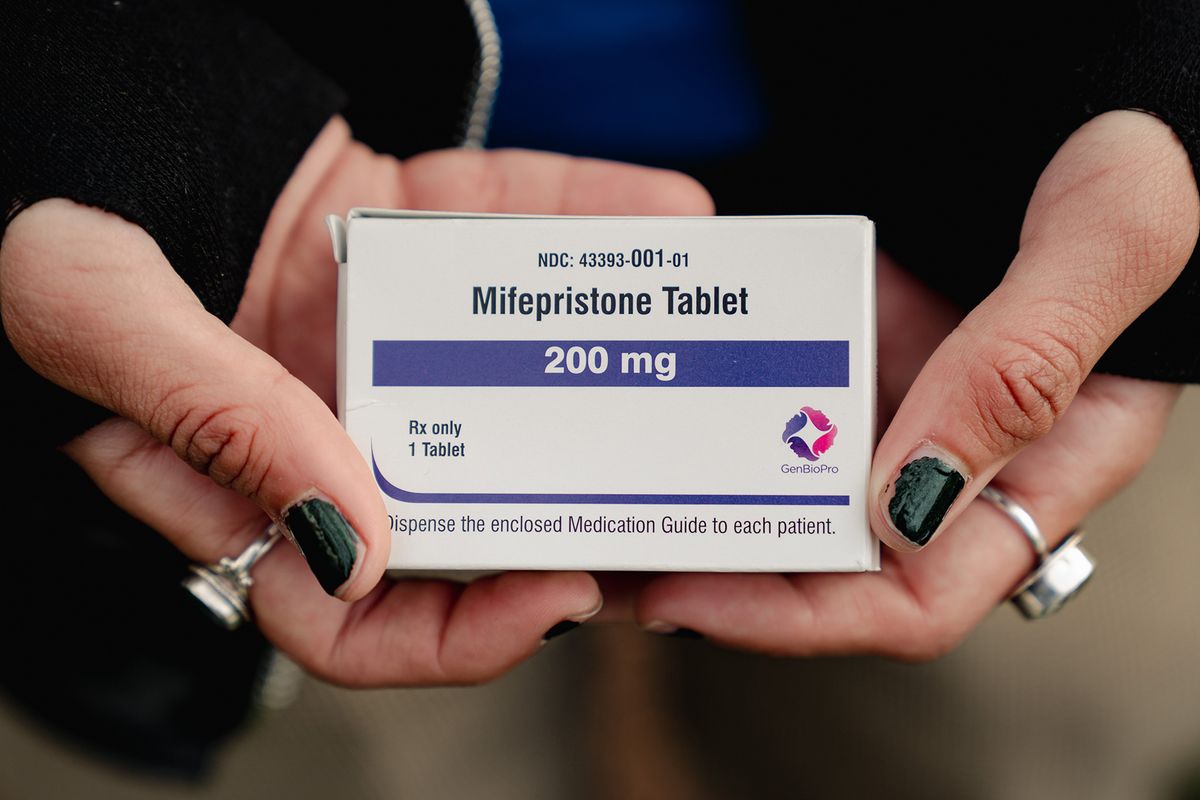On Tuesday, lawmakers in Louisiana voted 64-29 to reclassify drugs used in abortion as controlled dangerous substances. It’s a move staunchly protested by hundreds of physicians in the state, who fear passing this bill will interfere with patient care given how commonly one of the pills, misoprostol, is used to save lives in pregnancy care.
“Misoprostol is such a literal life-saver,” New Orleans OB-GYN Dr. Nicole Freehill tells Rolling Stone. “It’s disappointing this bill is moving forward, but I am still hopeful the Senate and/or the governor will listen to the hundreds of physicians who are opposed to this change and not pass or sign the bill.”
The floor debate for SB 276 was initially scheduled for Monday, but was deferred to Tuesday. State Rep. Mandie Landry sought to pass an amendment deleting the controversial amendments from the bill or recommit the bill to the health and welfare committee for more discussion, but her motions failed. “Placing mifepristone and misoprostol on the controlled substances list is harmful and malicious,” Landry says. “It is purely the product of Louisiana Right to Life and their politics. Doctors and common sense are all against it.”
Toward the end of a heated debate, state Rep. Aimee Freeman got passionate. “I understand that Right to Life runs some of your worlds, and I’m sorry that you can’t see what the doctors have come to us to tell us. If you believed in the right to life, you would believe in maternal outcomes being the best for the women of this state,” she said.
Landry, who spoke out against the mifepristone and misoprostol amendments multiple times throughout the debate, said of Right to Life: “The amount of power they have in here is so insulting to me. They’ve abused this process so many times; they’ve manipulated it. Everyone in here knows that; no one’s denying it. And they hijacked a bill.”
Vice President Kamala Harris weighed in after the vote, posting on X: “Absolutely unconscionable. The Louisiana House just passed a bill that would criminalize the possession of medication abortion, with penalties of up to several years of jail time. Let’s be clear: Donald Trump did this.”
Now that the state House has voted to move SB 276 forward, it will head back to the state Senate for another vote, but the legislation is expected to become law. Republican Gov. Jeff Landry (no relation to Mandie) is firmly opposed to abortion rights. His spokesperson did not respond to a request for comment.
Misoprostol and mifepristone both have other clinical uses, but they have come under increased scrutiny because the pills may be taken to induce an abortion. Louisiana has a near-total abortion ban which has been in place since August 2022, with no exceptions for rape or incest, and narrow exceptions for life of the pregnant person and “medically futile” pregnancies.
Last-minute amendments added to the state’s bill would reclassify mifepristone and misoprostol as Schedule IV controlled dangerous substances under Louisiana law, an unprecedented move. OB-GYNs in the state argue that since abortion is illegal, they do not use the pills for this purpose and rarely use mifepristone at all. But they emphasize that misoprostol is used daily for miscarriage care, to induce labor, to stop postpartum hemorrhaging, and to prepare the cervix for medical procedures. Health care workers are deeply concerned reclassifying the medications will be harmful to their patients and potentially delay care in life-or-death situations.
While the bill contains an exception for pregnant women who are found in possession of the medications, anyone else without a prescription can be sentenced to felonies, punishable with up to 10 years in jail. Reproductive health advocates and health care professionals are worried about what precedent this will set not only for Louisiana, but for other red states, where maternal health is already in peril, that might follow suit. This move to classify the misoprostol and mifepristone as “dangerous controlled substances” could signal the latest front in Republican-led states’ war on reproductive health.
SB 276 STARTED OUT as a bill filed by state Sen. Thomas Pressly (R) with the intent of making “coerced criminal abortion by means of fraud” a crime. Pressly’s sister, Catherine Herring, was slipped abortion medication without her consent by her husband, who pleaded guilty to drugging her drinks in a plea deal. After the bill passed the state Senate, it went to the state House and while it was being discussed in a criminal justice committee hearing, Pressly surprised doctors, advocates, and legislators alike by adding amendments, co-written by Louisiana Right to Life, which would reclassify mifepristone and misoprostol.
Doctors across the state were stunned and scrambled to put together a response before the revised bill came to a vote. More than 280 physicians, including OB-GYNs and emergency room doctors, signed a letter begging Pressly to reconsider his amendments, which they said create “the false perceptions that these are dangerous drugs.” Neither drug comes with a risk of addiction, which is generally what is meant by at risk of abuse, when determining whether a medication should be on the controlled substances list. Joe Fontenot, the executive director of the Louisiana Board of Pharmacy, confirmed to NPR that under Louisiana law, abuse refers to addiction.
The doctors’ letter to Pressly states, “Mischaracterizing misoprostol, a drug routinely and safely used on labor units throughout the state, as a dangerous drug of abuse creates confusion and misinformation, and harms women seeking high quality maternal care.”
Pressly responded by saying that since filing his bill, he has heard stories from “additional victimized women” who have “experienced trauma due to misoprostol or mifepristone.” He says this led him to believe the drugs were a public health risk, which is why he added the amendments. (Pressly’s office did not respond to a request for comment regarding these claims.)
Pressly, who is not a doctor, said that the doctors he did consult with assured him the re-classification would not harm health care for women. Again, this is in direct opposition to 280 health care professionals who think otherwise. Last week, the state’s powerful anti-abortion organization Louisiana Right to Life defended Pressly’s amendments by releasing what they called an “investigative report” about the supposed “rampant abuse of abortion pills.” The organization does not use the word “abuse” in the same way doctors do; instead, they detail stories of women who posed as pregnant minors in order to show how easy it is to acquire abortion medication online.
The group’s report includes a claim from an anti-abortion pregnancy center about patients who have reached out after experiencing complications while self-medicating. Of course, one way to solve this issue would be to legalize abortion in the state again. Since the Supreme Court issued its Dobbs ruling allowing states to ban abortion, the U.S. has seen an increase in medication abortion as pregnant people attempt to seek care in red states by ordering pills online.
On Monday, the president of the Louisiana Society of Addiction Medicine submitted a letter to the speaker of the state house, referring to SB276 as “legislative overreach” and voicing the organization’s opposition to the legislation: “This bill goes against the spirit of the drug scheduling system.”
The Louisiana bill has spurred an outcry from reproductive health advocates across the country, who worry that consequences could reverberate across states with restrictive abortion access. “These politically motivated and cruel restrictions undermine the safety and autonomy of individuals seeking abortion care, during a time in our nation’s history when reproductive care is being used as a political issue,” says Nourbese Flint, President of abortion justice organization All* Above All. “Now more than ever, it’s crucial to ensure that medication abortion and all forms of reproductive health care are classified as lifesaving and essential medications and remain accessible and affordable for everyone, regardless of their circumstances.”
ALL THE HEALTH CARE professionals that Rolling Stone spoke with in recent weeks have stressed the same point: Misoprostol is much more than an abortion pill.
“Calling it an abortion drug is absurd, it is a very common pregnancy drug,” says one health care professional who asked to remain anonymous. “Misoprostol is used in many, many routine pregnancies; its use in abortion is the rarity and exception. It’d be like calling a speculum an ‘abortion tool.’”
“Literally every single day on labor and delivery, someone, if not multiple people, is receiving misoprostol for induction of labor,” says Freehill, the New Orleans OB-GYN. “It’s a very inexpensive medication and very effective at preventing hemorrhage, for IUD insertions, for endometrial biopsies, to prep a patient’s cervix when they have a miscarriage. It’s utilized for so many things and on a very regular basis.”
She likens adding misoprostol to the controlled dangerous substance list to reclassifying Tylenol as dangerous. “Misoprostol saves tens of thousands of lives every year because of its ability to prevent or stop postpartum hemorrhage,” she says. “It is just so commonly used and such a fantastic medication in all of these non-abortion uses, so for it to come under attack and go under Schedule IV, it was like ‘What do you mean?!’”
Postpartum hemorrhage is the third-leading cause of maternal mortality. Louisiana is already one of the states with the worst maternal mortality rates in the country, with rates even worse for women of color. Even before the abortion ban, four Black mothers were dying for every white mother.
Freehill says that while advocates of the reclassification amendments claim doctors can keep using the medications as they did before, this only works in theory. Since Dobbs, she’s had numerous problems getting misoprostol filled for patients and had multiple instances of pharmacists telling her they would not prescribe it under any circumstances. She worries this will only get worse if the medication becomes classified as a Schedule IV drug.
Any delay in a patient receiving misoprostol could be life-threatening, adds Freehill. She poses a hypothetical of a patient who is heavily bleeding attempting to fill the prescription and getting denied by a pharmacy. “I may or may not get that message right away, and hopefully quickly resolve that problem,” she says.
Depending on how long it takes the patient to get the medication, it could result in life-threatening hemorrhage or require surgery to fix what should have been resolved with prompt, evidence-based care. Any hoops added to the process create risk.
Additionally, Freehill and fellow doctors are worried that patients will be confused about the medication in general. Even if there is an exception for pregnant women who use the drugs without a prescription, Freehill notes most patients don’t read the detailed intricacies of legislation. She says she has already provided care to multiple patients who, in the midst of having a miscarriage, have asked her if they are going to be investigated for their medical emergencies.
Dr. Jennifer Avegno is the director of New Orleans’ health department. She says that mischaracterizing misoprostol and mifepristone as “dangerous” is “bad science,” and none of her colleagues or the 280 health care professionals who signed the letter have identified any case of the drugs being abused like other Schedule IV drugs like Xanax and Valium.
“As an emergency physician, neither I nor my colleagues have encountered cases of overdose, intoxication, or withdrawal symptoms from either drug,” Avegno tells Rolling Stone. “These medications do not meet the medical standard for ‘drugs of abuse,’ nor are they public health hazards — no public health agency has defined or identified them as such. In a state with some of the worst outcomes for maternal health, why would we want to make childbirth and pregnancy care more dangerous through bad science and inappropriate use of the law?”
Avegno worries about what precedent this will set. “What is to stop a legislator from being able to place any medication they might like — or they might have some financial reason to decrease use — on the list?” she says.
Freehill expresses a similar concern, wondering if birth control pills or IUDs could be future targets. She also worries that if pharmacies are scared to stock the medication, it would cause a shortage. In her opinion, Pressly should pass his legislation to criminalize coerced abortions by means of fraud, without his recent additions criminalizing mifepristone and misoprostol.
“I feel like that’s appropriate, and right now that’s enough,” says Freehill. “We need to do a lot more research. I don’t think we have to go to this next step that could affect so many thousands of women across our state in a negative way that is not intended.”












 Jean Jacket: Repull/Jewelry: Personal collection
Jean Jacket: Repull/Jewelry: Personal collection Hat: Xtinel/Dress shirt and vest: Raphael Viens/Jewelry: Personal Collection & So Stylé
Hat: Xtinel/Dress shirt and vest: Raphael Viens/Jewelry: Personal Collection & So Stylé  Dress: Helmer/Jewelry: Personal Collection
Dress: Helmer/Jewelry: Personal Collection  Jewelry: Personal Collection
Jewelry: Personal Collection  Dress: Helmer/Jewelry: Personal Collection
Dress: Helmer/Jewelry: Personal Collection 

 Catering Presented By The Food DudesPhoto by Snapdrg0n
Catering Presented By The Food DudesPhoto by Snapdrg0n Catering Presented By The Food DudesPhoto by Snapdrg0n
Catering Presented By The Food DudesPhoto by Snapdrg0n Catering Presented By The Food DudesPhoto by Snapdrg0n
Catering Presented By The Food DudesPhoto by Snapdrg0n
 Photographer: Raphaëlle Sohier / Executive production: Elizabeth Crisante & Amanda Dorenberg / Design: Alex Filipas / Post-production: Bryan Egan/ Headpiece: Tristan Réhel
Photographer: Raphaëlle Sohier / Executive production: Elizabeth Crisante & Amanda Dorenberg / Design: Alex Filipas / Post-production: Bryan Egan/ Headpiece: Tristan Réhel Photo: Raphaëlle Sohier
Photo: Raphaëlle Sohier Photo: Raphaëlle Sohier/ Photo production: Bryan Egan/ Blazer:
Photo: Raphaëlle Sohier/ Photo production: Bryan Egan/ Blazer:  Photo: Raphaëlle Sohier/ Blazer: Vivienne Westwood/ Skirt :
Photo: Raphaëlle Sohier/ Blazer: Vivienne Westwood/ Skirt : 
